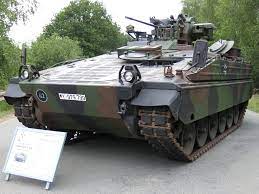28 April 2022
Country of Origin
Switzerland, Germany and arms for Ukraine.
By Neil Tidmarsh

How about this for a bizarre situation. You’re in a confectioner’s shop. You choose a big box of chocolates and take it to the shopkeeper at the till. He looks at it and says “Hmmm, Swiss chocolates. What are you going to do with them?”
“Eat them, of course,” you say.
“Eat them? Well, in that case, I’m afraid I can’t sell them to you.”
“What?”
“If you were just going to look at them, or store them in a cupboard, or put them away in a drawer and forget about them, well, then I could let you buy them. But not if you’re going to eat them.”
“But… But… isn’t that what chocolates are for? Isn’t that the whole idea? They’re made to be eaten, aren’t they?”
“I’m sorry. Don’t blame me. Blame the manufacturer. It’s in his contract. He agrees to supply me with his products as long as I don’t pass them on to anyone who might actually eat them. It’s his fault, not mine.”
“What? But that’s crazy! Surely there’s been some mistake! Can we talk to the manufacturer?”
So the shopkeeper gets Herr Schokoladenhersteller (maker of the world’s finest and most expensive confectionery) on Zoom from Zurich, and he explains that no, there has been no mistake.
“But… but… I need them for my Mum’s birthday!” you protest. “The whole family’s looking forward to eating them!”
“In that case, Mein Herr, I certainly cannot allow my esteemed client to pass them on to you” says Herr Schokoladenhersteller. “Guten Tag und auf Wiedersehen.”
You leave the shop bewildered and empty-handed.
Absurd? Impossible? Well, the same thing happened in Germany this week; Switzerland forbad Germany from passing on ammunition, which Germany had obtained from Switzerland, to Ukraine on the grounds that the ammunition would be used in a conflict zone. What? But isn’t that exactly what ammunition is for? It’s made to be used in conflict zones, isn’t it? Absurd! Impossible! Ok, arms and ammunition do terrible things when used for their intended purpose (just as all that sugar and fat in chocolate is really bad for the consumer’s health), of course conflict zones are terrible places, but if you’re worried about that then you shouldn’t be manufacturing and selling arms (or chocolate) in the first place. Making a fortune out of your country’s arms industry (record profits of £750 million in Switzerland last year) and yet preventing your clients from using your product in earnest smacks of hypocrisy or worse. It’s having your cake and eating it. While others who have your cake can’t eat it.
The Swiss-made ammunition in question is for the German-made Marder light tank. Under international “country of origin” laws, Germany couldn’t pass on its supplies of the ammunition to Ukraine without Switzerland’s permission to do so. Switzerland denied Germany’s request, citing traditional Swiss neutrality which it says prevents it from providing arms in conflict zones. (And yet, Switzerland has sold arms and armaments to Russia even when Russia was fighting in Syria, according to the Swissinfo.ch branch of the Swiss Broadcasting Corporation and to the Neue Zurcher Zeitung newspaper. So much for not selling to countries involved in armed conflicts. Swiss arms for Russia, no Swiss arms for Ukraine? So much for neutrality.)
So, without ammunition, Germany’s Marder armoured personnel carriers will not be going to Ukraine. This apparently was the second time Switzerland had refused permission for Germany to supply Swiss-made material to Ukraine. It rejected a similar request from Poland in March. Germany itself recently tried to use the “country of origin” laws to stop Estonia from supplying Ukraine with German-made howitzers.
The purpose of the “country of origin” laws is to prevent the products of your country’s arms industry from ending up in your enemy’s hands or in the hands of aggressive, war-mongering regimes engaged in unjust wars. But those criteria can’t possibly apply to Ukraine. On the contrary, it’s an internationally-recognised, democratic country engaged in a life-or-death struggle against an unprovoked invasion by Putin’s neo-fascist Russia (repression, censorship, brain-washing propaganda, dictatorship and militarism at home; war-mongering, widespread destruction and the mass killing of civilians abroad). Zelensky insists that Ukraine is fighting for the whole of Europe, and the threats which Russia has made to the rest of Europe since the build-up to this war suggest that he is right.
Professor of war studies Georg Löfflmann was quoted in The Times this week as saying that the Swiss refusal of Germany’s request “is quite convenient for (German chancellor) Scholz. It acts as political cover because he doesn’t actually want to send the Marder or Leopard tanks anyway.”
Germany’s chancellor Olaf Scholz is caught between two stools. On the one hand, there are the pro-Russian traditions and veterans of his own Social Democratic Party (its elder statesman and former chancellor Gerhard Schröder is a friend of Putin and is alleged to earn one million euros a year as a board member of two Russian state energy companies; last week Germany’s SDP president Frank-Walter Steinmeier was told he wouldn’t be welcome in Ukraine because of his pro-Russian, Putin-friendly history). On the other hand, there are his coalition partners (the Greens and the Free Democratic Party) and the USA and the rest of Nato who are urging him to do more to help Ukraine.
He’s agreed to sanctions against Russia and has re-set Germany’s defence policy to massively increase spending on its own armed forces and on material aid to other countries, primarily Ukraine. But he’s refusing to send heavier aid – such as the Marder and Leopard 1 fighting vehicles and the Panzerhaubitze 2000 self-propelled howitzers – with the questionable excuses that this would leave Germany unable to defend itself, that it would take too long to train the Ukrainians to use them, etc, etc. Germany is also facing mounting criticism for its uneasiness about cutting its reliance on Russian energy, which it claims would cost it 2.2% of GDP.
The EU has a massive duty towards Ukraine following that trade and security Association Treaty of 2013 (which, by the way, Brussels implemented before it had been approved by all of its member states; and the Netherlands actually rejected it in a referendum in 2016). Germany, at the economic and political heart of the EU, should be particularly alert to that duty. As Ben Wright pointed out in The Daily Telegraph last week, Greece, at Germany’s insistence, recently fulfilled its obligations towards the euro and the EU by accepting harsh austerity policies which shrank its economy by 25%; what’s 2.2% compared to that? And what’s 2.2% compared to the cost Ukraine is paying right now?


